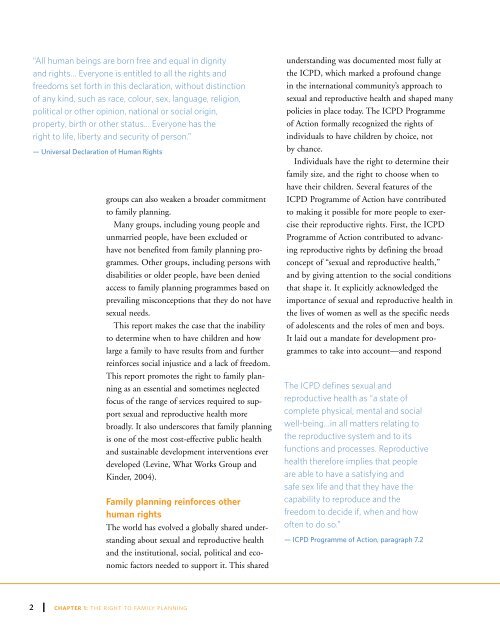State of World Population 2012 - Country Page List - UNFPA
State of World Population 2012 - Country Page List - UNFPA
State of World Population 2012 - Country Page List - UNFPA
Create successful ePaper yourself
Turn your PDF publications into a flip-book with our unique Google optimized e-Paper software.
“All human beings are born free and equal in dignity<br />
and rights… Everyone is entitled to all the rights and<br />
freedoms set forth in this declaration, without distinction<br />
<strong>of</strong> any kind, such as race, colour, sex, language, religion,<br />
political or other opinion, national or social origin,<br />
property, birth or other status… Everyone has the<br />
right to life, liberty and security <strong>of</strong> person.”<br />
— Universal Declaration <strong>of</strong> Human Rights<br />
groups can also weaken a broader commitment<br />
to family planning.<br />
Many groups, including young people and<br />
unmarried people, have been excluded or<br />
have not benefited from family planning programmes.<br />
Other groups, including persons with<br />
disabilities or older people, have been denied<br />
access to family planning programmes based on<br />
prevailing misconceptions that they do not have<br />
sexual needs.<br />
This report makes the case that the inability<br />
to determine when to have children and how<br />
large a family to have results from and further<br />
reinforces social injustice and a lack <strong>of</strong> freedom.<br />
This report promotes the right to family planning<br />
as an essential and sometimes neglected<br />
focus <strong>of</strong> the range <strong>of</strong> services required to support<br />
sexual and reproductive health more<br />
broadly. It also underscores that family planning<br />
is one <strong>of</strong> the most cost-effective public health<br />
and sustainable development interventions ever<br />
developed (Levine, What Works Group and<br />
Kinder, 2004).<br />
Family planning reinforces other<br />
human rights<br />
The world has evolved a globally shared understanding<br />
about sexual and reproductive health<br />
and the institutional, social, political and economic<br />
factors needed to support it. This shared<br />
understanding was documented most fully at<br />
the ICPD, which marked a pr<strong>of</strong>ound change<br />
in the international community’s approach to<br />
sexual and reproductive health and shaped many<br />
policies in place today. The ICPD Programme<br />
<strong>of</strong> Action formally recognized the rights <strong>of</strong><br />
individuals to have children by choice, not<br />
by chance.<br />
Individuals have the right to determine their<br />
family size, and the right to choose when to<br />
have their children. Several features <strong>of</strong> the<br />
ICPD Programme <strong>of</strong> Action have contributed<br />
to making it possible for more people to exercise<br />
their reproductive rights. First, the ICPD<br />
Programme <strong>of</strong> Action contributed to advancing<br />
reproductive rights by defining the broad<br />
concept <strong>of</strong> “sexual and reproductive health,”<br />
and by giving attention to the social conditions<br />
that shape it. It explicitly acknowledged the<br />
importance <strong>of</strong> sexual and reproductive health in<br />
the lives <strong>of</strong> women as well as the specific needs<br />
<strong>of</strong> adolescents and the roles <strong>of</strong> men and boys.<br />
It laid out a mandate for development programmes<br />
to take into account—and respond<br />
The ICPD defines sexual and<br />
reproductive health as “a state <strong>of</strong><br />
complete physical, mental and social<br />
well-being…in all matters relating to<br />
the reproductive system and to its<br />
functions and processes. Reproductive<br />
health therefore implies that people<br />
are able to have a satisfying and<br />
safe sex life and that they have the<br />
capability to reproduce and the<br />
freedom to decide if, when and how<br />
<strong>of</strong>ten to do so.”<br />
— ICPD Programme <strong>of</strong> Action, paragraph 7.2<br />
2 CHAPTER 1: THE RIGHT TO FAMILY PLANNING
















